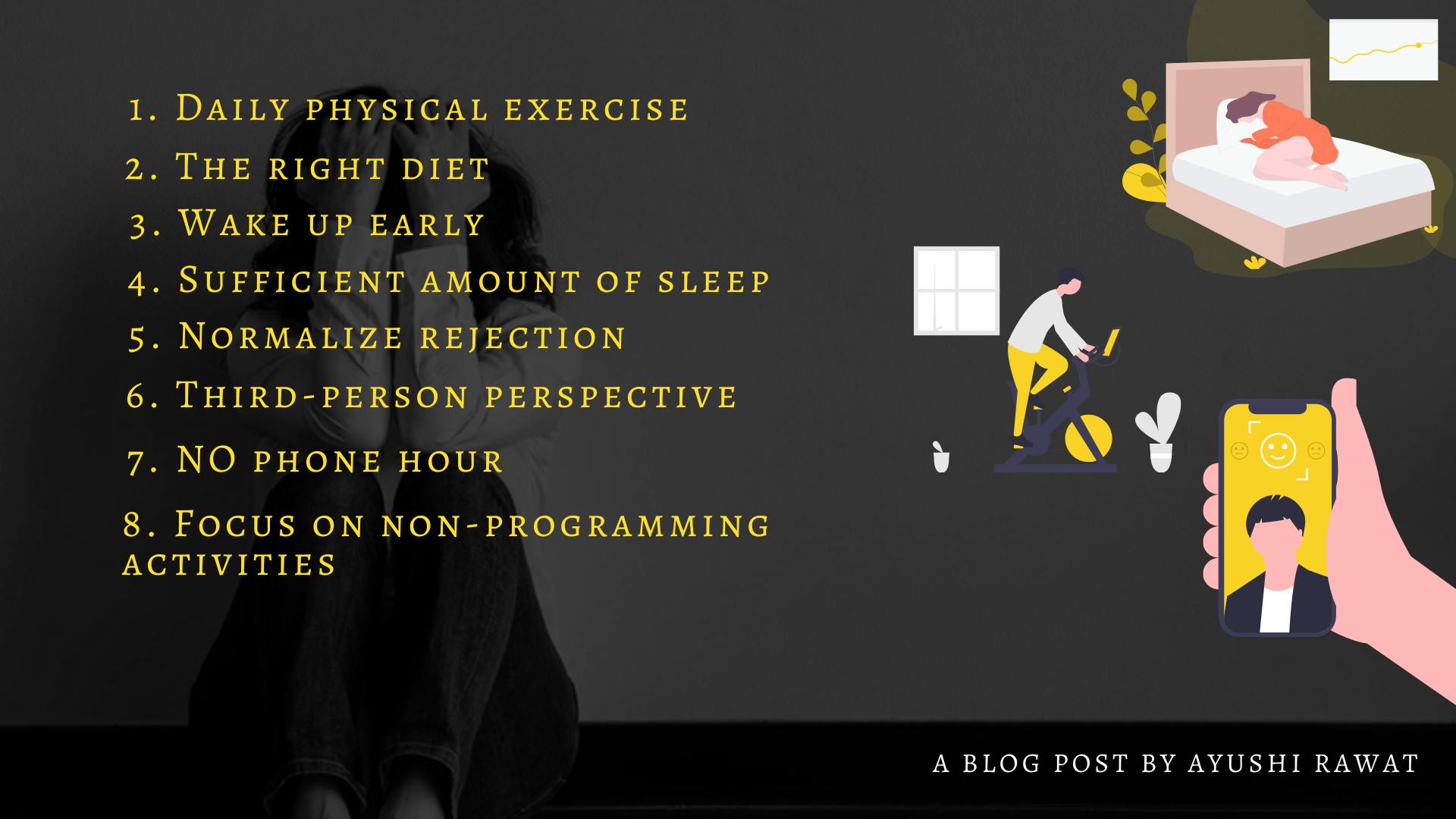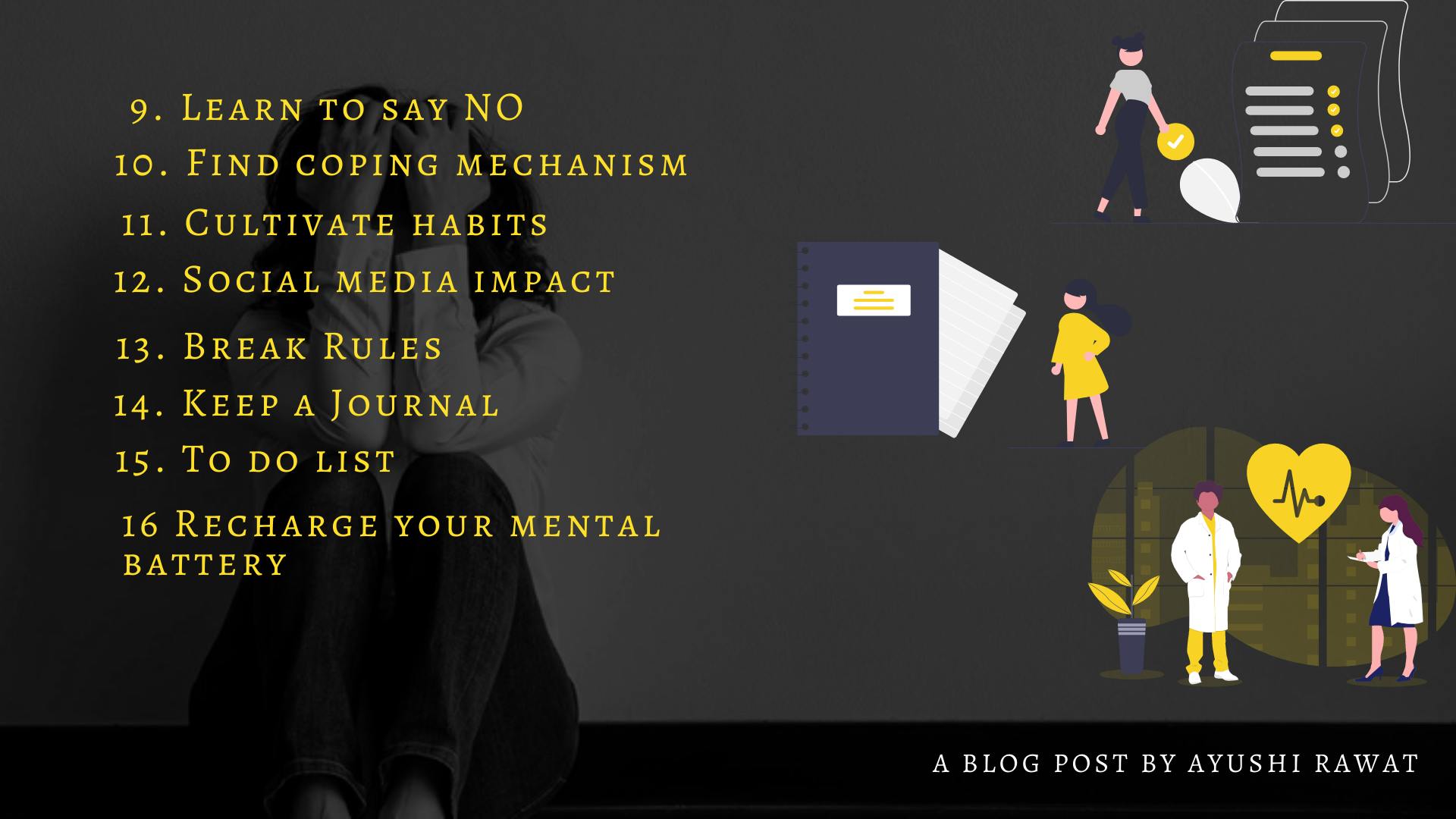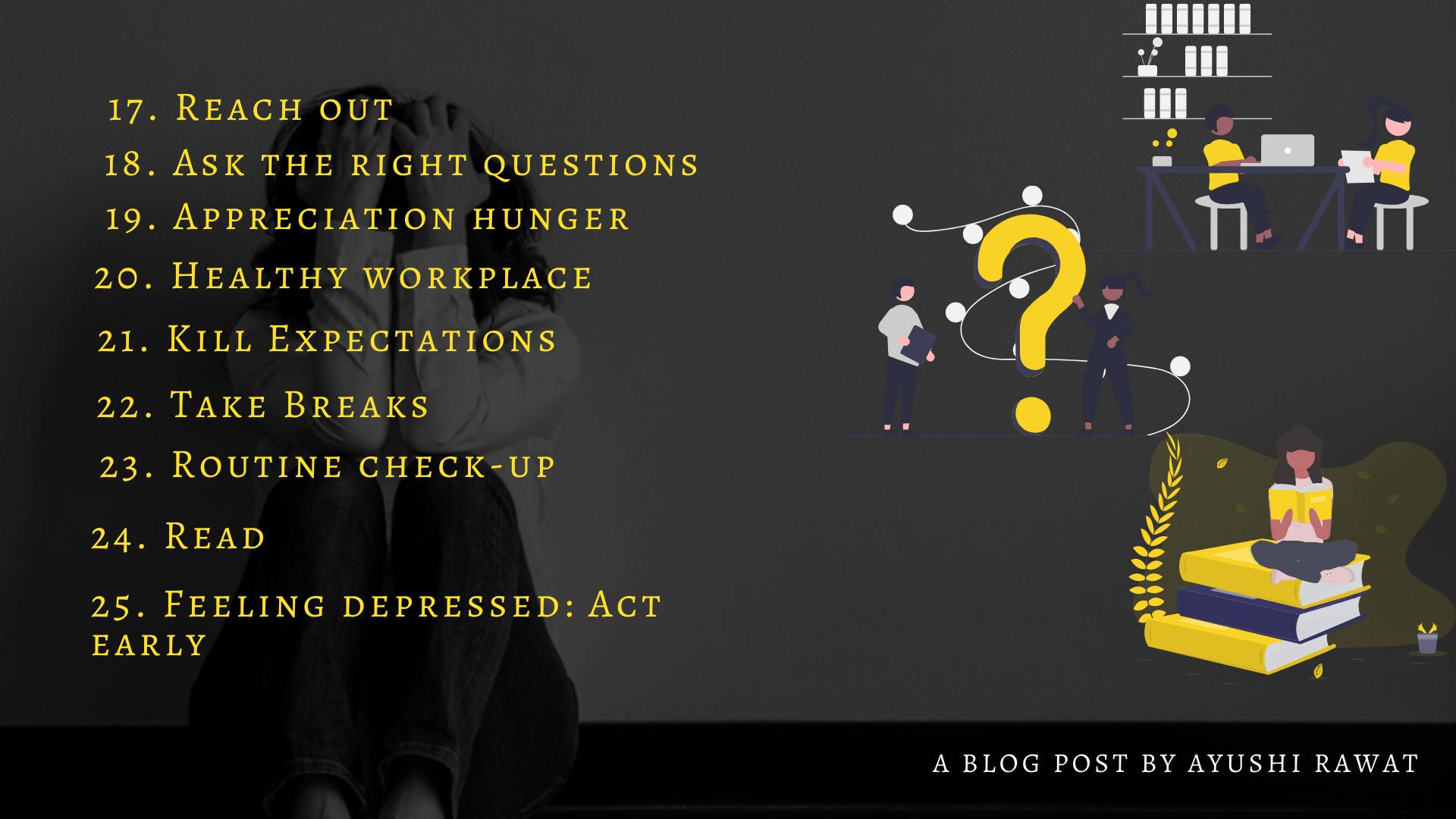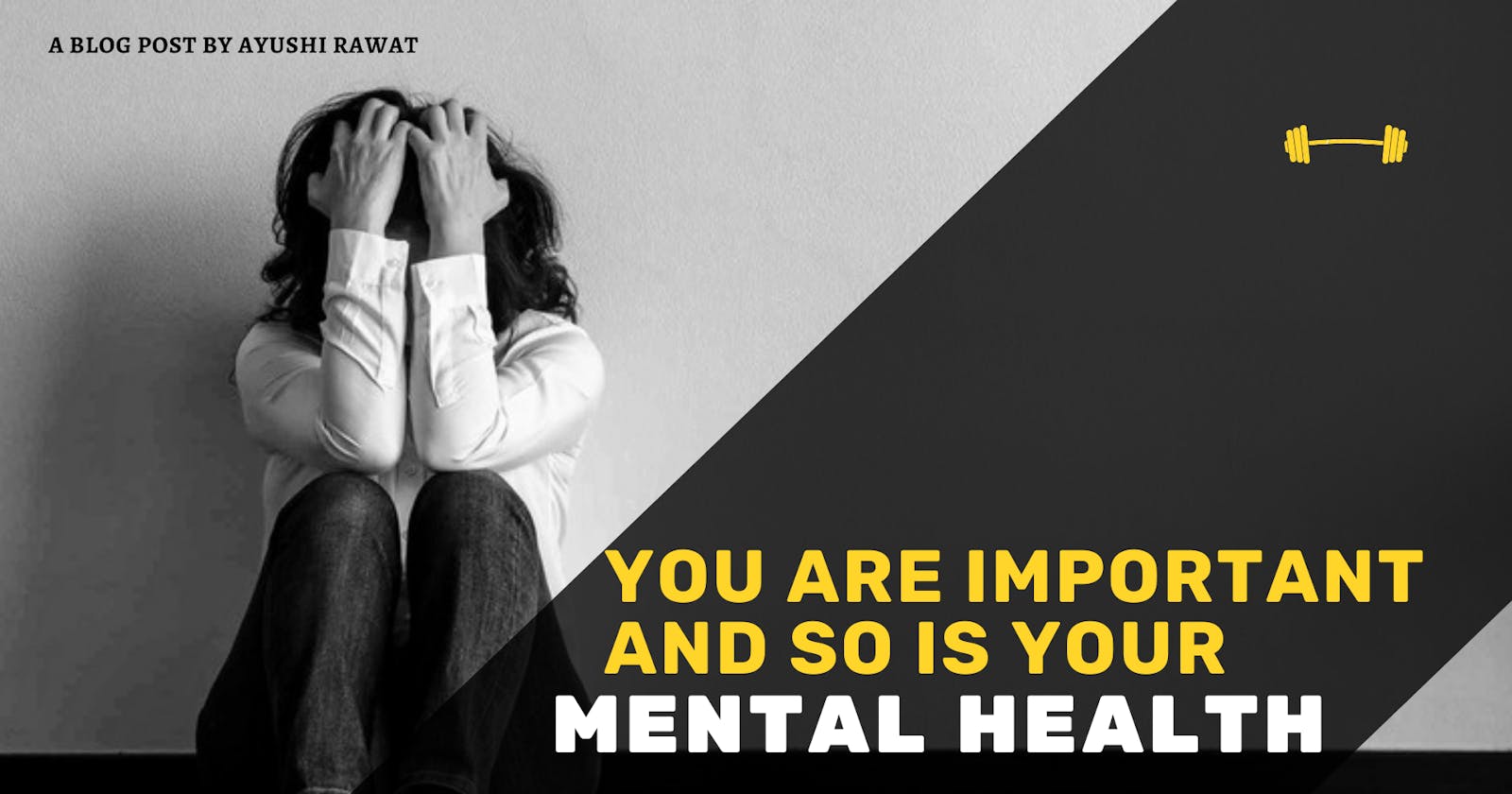Life a rollercoaster ride, acknowledging that mental ups and downs are a part of life is the very first step. A healthy mind can achieve everything in life.
You may experience good days, when your code successfully complies after days of hard work, that moment is pure joy.
The way your brain works is unique. Mental illnesses affect people in different ways, everyone processes differently.
Here are 25 ways you can implement to optimize your mental and physical health to ensure that you remain at your best long into your career and personal stability.
Disclaimer: I AM NOT A MEDICAL PROFESSIONAL AND THIS ADVICE SHOULD NOT BE MISCONSTRUED AS MEDICAL ADVICE IN ANY WAY. THIS IS PURELY ANECDOTAL BASED ON WHAT'S WORKED FOR ME. PLEASE SEEK A PROFESSIONAL FOR HELP IF NECESSARY.

1. Daily physical exercise
A healthy mind resides in a healthy body. Do some physical exercise as a part of your daily routine, make it a habit. Practice stretching whenever possible and practical, at least five minutes every hour or start (mild) exercising every single day. It can be as much as 20 min.
Any form of physical activity will do the trick. It has real benefits, it increases our brain's productivity and improves our body's blood and oxygen flow.
Try yoga or meditation for instance. It helps train your mind to focus and redirect your thoughts.
2. The right diet
The very first tip is to Stay hydrated. It can do the trick.
Developers have a “sitting” job so it becomes very necessary to include the right ingredients in your diet. After all, its the fuel for the body, include healthy salads. Eat fresh green leafy vegetables more often.
You might already be aware of this, but, do you really follow it?
3. Wake up early
Start following a sleep cycle. IT industry causes mental exertion if not taken proper health measures. If it's hard for you so maybe you can start by sleeping an hour early. It's not something you can transform within a day.
Drink green tea. Well, it works for me.
4. Sufficient amount of sleep
We are particularly prone to frustration when we see little or no progress after several weeks of practising something new. It’s important that we treat our tired minds to what they’re asking for: rest.
It is crucial to maintain a balance between the number of hours spent awake vs. asleep. If you sleep less and code more you will eventually burn out.
It helps reduce stress and while you sleep, your blood pressure goes down, giving your heart and blood vessels a bit of a rest.
5. Normalize rejection
Do not lower your self-esteem at any cost. Know your worth.
Rejection is not the end of the world — It’s the beginning of a new one. Trying to avoid rejection and failure is like trying to avoid progress.
Do not jump to instant conclusions, sleepover and see for yourself, if it wouldn't matter a year later, do not waste your energy over it.
6. Third-person perspective
Do not blame yourself. Think rationally. What would you do if a friend of yours called seeking help?
Yes, its easier said than done, but Why not do the same for yourself? Consider the viewpoint outside of emotion.
To start, tell yourself how great your day is going to be, If you encounter a rough morning, go outside for a few minutes and attach yourself to some positive affirmations.
7. NO phone hour
Remove the source of toxicity in your life. Be closer to nature. Period.
Go for a walk, it always helps. Reduce your screen time, honestly, it directly affects your health. The early you realize it, the more beneficial it will be for you as short-term downtime can have long-term payoffs.
Do you get dry and strained eyes? stare into the distance for 30 seconds, every 30 minutes. Sit near a window.
8. Focus on non-programming activities
We neglect a very important component of our performance: ourselves!
You can call it a little downtime period, But it will turn out to be the most important part of the day as you are shifting focus to yourself, it will help you keed your spirit up while at work.
You can doodle, watch a Stand comedy or TED talks or binge watch Netflix or maybe listen to your favourite podcasts.

9. Learn to say NO
Working overtime is never the solution. Do not make rash decisions over temporary emotions. Be clear and honest with yourself about what you truly want. Understand what are you feeling without rationalising it and act accordingly.
The ability to say no is closely linked to self-confidence. If you want to say no, be firm and direct.
10. Find coping mechanism
Coping mechanisms help us deal with stress or difficult emotions, adjust to stressful events and maintain our emotional well-being.
Some like to listen to music to calm themselves or some sleep. If you ask me I like to write, I write my heart out in my private diary. Find out what works best for you.
Spend some alone time, get to know yourself better. Work on a social/political cause, volunteer at an NGO, read on how to make the world a better place.
11. Cultivate habits
Be assertive, crafting the habit of assertiveness means learning to go after what you want with confidence.
Study other people. Try and pay attention to their little habits and how they respond to difficult situations and stress.
Our ability to improve is largely determined by our habits. Our habits influence the way we respond to any given situation, and ultimately they define how efficient we can become.
12. Social media impact
Do not check your cell phone first thing in the morning. If your morning routine involves checking Facebook or scrolling through Instagram, you’re starting off on the wrong foot.
Ask yourself: What is your takeaway, what you get in return from investing time at social media? Is it worth it? I would suggest calling a friend.
On social media, people are showing their highlight reel and you are comparing it to your entire body of work, it may lead you to feel incompetent.
Rather join a community and share your knowledge, learnings and experience.
13. Break Rules
There are certainly some downfalls to being a software engineer or freelancer, break the loop!
You are allowed to follow your heart. Make mistakes as they are not wrong, they are part of learning and evolving.
14. Keep a Journal
Let it go. Once you give the child what it wants, it stops pursuing/ annoying you. The same is with your emotions, once felt and heard, will be released.
Writing is an art, you may often get caught with thoughts that are not grounded in reality and go beyond the situation that you experienced.
Pouring your thoughts in writing is a beautiful process, and it helps. You could start with writing about your day and feelings.
15. To do list
Prioritize everything.
Sometimes it’s difficult to focus on the big picture, so make a to-do list and follow one thing at a time, it will help you stay organized. It may give you a sense of achievement. You can go for a whiteboard, online planner app or whatever suits you best.
Start by making short term goals. It provides clarity of thoughts and helps you get started and will provide a single point of focus. You can celebrate these small successes along the way to your larger goal.
16 Recharge your mental battery
If a certain emotion is not felt completely or in other words not allowed to pass through, it tends to get stuck in the body and over time can cause us physical ailments.
Do a little self-talk, sleeping helps physically but what about mental health? Recharge yourself just like you recharge your cell phone every single day.

17. Reach out
Try building a network of support, it is perhaps the most important part of recovery and strong mental health. Try to shift your focus. Add your favourites to your speed dial. I always call up mother, find out your goto person.
The COVID time can be really difficult, I would suggest you keep social distancing in mind, but calling up somebody could work. Share your thoughts, discuss your feelings, it can help you feel at ease.
If you are doing great, try to reach out to your close ones, they might not be in the same place as you are. A little talk can power charge them.
18. Ask the right questions
Too many people live like this — they follow along the prescribed path, never asking questions or pausing or exploring or pushing back.
Do not overthink. Ask yourself the right question, try to find out the root cause. Questions like “What is my long-term goal?” “Why am I feeling like this?”
To dig deeper into the problem, ask the question why five times. The answers will uncover a deeper root cause.
19. Appreciation hunger
Be hungry to learn but do not grow hunger of appreciation. Do not set high expectations from others.
A more healthy emotion and consequence is accepting reality, even if reality is unpleasant. Other people may treat you disrespectfully, they owe you nothing, and they are no less of a human than you.
Be self-motivated, its what pushes you to go on.
20. Healthy workplace
Double-check your work environment before stepping into a job. Your team and manager should be there to support you, maintain healthy relationships. Approach your peers, seek help, share, get it out of your system.
Be sure to only engage in a healthy competition that stems from a growth mindset. It can become unhealthy when you are blind to improvements.
21. Kill Expectations
Let go of expectations and find something to be grateful about. Expectations may lead to false hope and disappointment and can hamper your mental health when things do not turn out the way you hoped, as a result, you will experience serenity rather than resentment.
22. Take Breaks
Realize your full potential, avoid multitasking.
Take breaks, the goal is to get out of your chair and move. Sometimes not doing anything is also a great remedy. Enjoy your free time.
A little tip, start setting alarms as a break reminder, if you feel you have a high probability of getting carried away with work deadlines.
23. Routine check-up
While we all experience negative emotions and irrational thoughts, when these are ongoing for a while and start to affect your daily life, you should look to medical professionals for assistance.
Make routine checkup a habit.
24. Read
Read positive articles, motivational or self-help books or whatever works for you. When you read, not only are you improving memory and empathy, but research has shown that it makes you feel better and more positive too.
For better results, you may want to choose a hardcopy rather than reading on a screen, since the light emitted by your device could keep you extra awake at night and lead to other unwanted health outcomes.
25. Feeling depressed: Act early
Keeping yourself occupied and distracted can be useful, temporarily. But it's not a long-term strategy. In addition to sitting too long in one spot, we as developers are prone to thinking about one thing for too long. Let it go.
Only you can be your true saviour.
Conclusion
Let it go, It will pass, do not hold on to it. Every day you are gifted a finite amount of mental energy. Don’t waste it. Just do not give up hope. Not knowing the answer today, doesn't mean you will never find it. If you have no clue on how to solve something, try and explore something else instead.
If these types of situations and irrational thoughts are negatively impacting your everyday life, seek the help of medical professionals.
If you have additional points, feel free to add those in the comments below.
If you experienced a downtime recently, share your thoughts on how you recovered from it as it can be a great takeaway for some people.
You can connect with me on Twitter Also, have a look at my other Blogs:
- Python 3.9: All You need to know
- The Ultimate Python Resource hub
- GitHub CLI 1.0: All you need to know
- Become a Better Programmer
- How to make your own Google Chrome Extension
- Create your own Audiobook from any pdf with Python
- You are Important & so is your Mental Health!
Share this with people you care about.
Much power to you, Take care!

